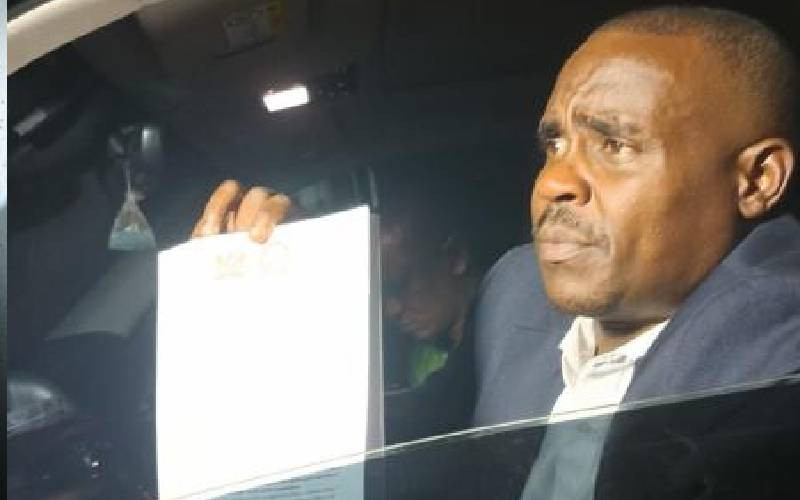Opinion
Echoes of War: Arrest of Playwright Malala Ill Informed

It’s impossible to find the plot of the play “Echoes of War” online. There were rehearsals, the troupe was preparing for the performance, the play was reviewed by the competition committee, and there was a court hearing regarding its content. Still: the plot of Malala’s play is nowhere to be found online.
What is available online? Furious discussions among users about video footage of Cleophas Malala’s arrest. And now we all want to know: what’s this play about? Everyone who said the police created free publicity for “Echoes of War” was right. Very soon, the plot will either be posted somewhere or start being reprinted and passed from hand to hand, and the author will become a cult figure. Bad idea number one.
Arresting a playwright for their work can be perceived as a violation of fundamental rights, such as freedom of speech, protected, for example, by Article 33 of the Kenyan Constitution of 2010. Do you understand? They wanted to avoid sparking new protests, so they created a new reason for protests. Bad idea number two.
There’s already been an example of such a mistake by the authorities in Kenya. Ngũgĩ wa Thiong’o, one of Kenya’s most famous writers and playwrights, was arrested in 1978 for his play “Ngaahika Ndeenda” (“I Will Marry When I Want”), co-written with Ngũgĩ wa Mĩrĩĩ. The play criticized corruption and inequality in postcolonial Kenya, leading to his arrest and imprisonment in a maximum-security prison without trial for nearly a year. The international community expressed concern, which damaged Kenya’s reputation. Unexpectedly, his works became a symbol of resistance. Bad idea number three.
The police will likely charge Malala with incitement to violence, which is a criminal offense in Kenya. This is based on Sections 96 and 391 of the Kenyan Penal Code. Section 96 provides for a penalty of up to 5 years in prison. The Constitution protects freedom of speech, but if those words are interpreted as incitement, Malala falls outside the Constitution’s protection.
Now, the most interesting part. The play had already been excluded from the competition in Nanyuki due to incitement. But on April 3, Judge Winfrida Okwany ruled that 50 participants must perform. In other words, the judiciary interpreted the law and determined that there was no incitement in the play. Meaning Malala is under the Constitution’s protection. Bad idea number four.
Nevertheless, the police (the executive branch, which doesn’t interpret laws) arrest the playwright. What does this say? It speaks to a conflict between the security forces and the judiciary. Actually, this is a red flag indicating a disruption in the balance of the state system. The police disregard the judge’s ruling, undermining judicial independence. Judicial independence is protected by Article 160 of the Kenyan Constitution. If the police directly defy the courts, that’s bad idea number five.
In 2024, President William Ruto publicly criticized the courts for “activism” and accused them of sabotaging government projects, also pointing to a trend of pressure on the judicial system. Now, no matter how the president reacts—he’ll be “to blame” for the arrest in the eyes of the public. Even if he had nothing to do with it. Though formally, Ruto could now compare himself to Trump, who also wages war against activist judges in the U.S. We’re fine with Trump, whatever nonsense he gets up to in the U.S. Just don’t touch Africa. But for a local guy to play with authoritarianism is bad idea number six.
To avoid creating a conflict that could lead to a power crisis, the police could simply talk to Malala or charge him with something unrelated to the play. Both options are bad ideas. Inviting him so loudly for a quiet talk is unprofessional. If charges are filed, it’s fuel for political conflicts. Without all this, the play could have been forgotten by summer.
There’s a way out: release him and delay the play’s release. There’s a more elegant way out: William Ruto personally acknowledges a misunderstanding, attends the play as a spectator, withstands the criticism, and even discusses it with the author privately, not necessarily publicly. What do you think, is such a twist in this drama possible?
P.S. In the end, the play’s performance is set to proceed with restrictions. The girls from the troupe are being greeted like stars. The play’s author is currently under arrest and is literally two steps away from becoming a new symbol of resistance against the authorities.
NB: Script of the Play, ‘Echoes of War’ as filed in Court. (Starts at Page 11 of the Pleading)
4TH APRIL BUTERE GIRLS COURT DOCSKenya Insights allows guest blogging, if you want to be published on Kenya’s most authoritative and accurate blog, have an expose, news TIPS, story angles, human interest stories, drop us an email on [email protected] or via Telegram
-

 News2 weeks ago
News2 weeks agoTHE FIRM IN THE DOCK: How Kaplan and Stratton Became the Most Scrutinised Law Firm in Kenya
-

 Investigations2 weeks ago
Investigations2 weeks agoMulti-Million Dollar Fraud: Three Kenyans Face US Extradition in Massive Cybercrime Conspiracy
-

 Economy2 weeks ago
Economy2 weeks agoIran Demands Arrest, Prosecution Of Kenya’s Cup of Joe Director Director Over Sh2.6 Billion Tea Fraud
-

 Grapevine1 week ago
Grapevine1 week agoA UN Director Based in Nairobi Was Deep in an Intimate Friendship With Epstein — He Even Sent Her a Sex Toy
-

 Business2 weeks ago
Business2 weeks agoA Farm in Kenya’s Rift Valley Ignites a National Reckoning With Israeli Investment
-

 Arts & Culture2 weeks ago
Arts & Culture2 weeks agoWhen Lent and Ramadan Meet: Christians and Muslims Start Their Fasting Season Together
-

 Business2 weeks ago
Business2 weeks agoKPC IPO Set To Flop Ahead Of Deadline, Here’s The Experts’ Take
-

 Politics2 weeks ago
Politics2 weeks agoPresident Ruto and Uhuru Reportedly Gets In A Heated Argument In A Closed-Door Meeting With Ethiopian PM Abiy Ahmed
















